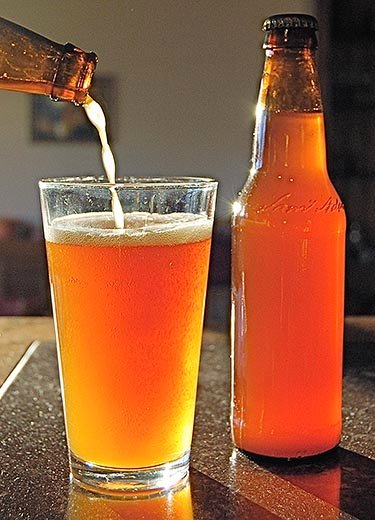Seven reasons you should brew your own beer (yes, you!)
People who haven't made their own beer often assume that making your own beer is complicated -- because it seems like it should be complicated. This perception can be reinforced by the intimidating-looking industrial-scale brewing equipment seen at local brewpubs.
But the truth is, making beer in your own home is surprisingly easy.
If you like beer, here are seven reasons you should consider making your own:
1) It's a fun, creative hobby

The best reason to brew your own beer is a simple one: because it's a hell of a lot of fun, and it's a great way to spend a relaxing afternoon.
Much like cooking, baking, or BBQing, the process of selecting, modifying, and actualizing your recipes provides a lot of creative freedom, and crafting your own product that you can then consume is both enjoyable and satisfying.
For extra creative types, you can create your own labels.
2) You can do it with your friends
Brewing is a great social activity. The process of brewing takes about 2-3 hours, but much of that time is spent waiting for your beer-in-progress (called wort) to heat up, boil, or cool down. That gives you plenty of time to socialize. Plus, you can pop open and consume a few brews while you're brewing.
Creating something by yourself is great. Creating something with others is even better. Your friends will be dying to know how what you made together tastes.
3) Your friends will love you, and beer makes awesome gifts
If your friends love beer, then they'll probably love the beer you made yourself (or with them). In part this is because it's something different that you can't get elsewhere. And in part, this is likely because it's free, and who doesn't love free beer? (unless you're charging them, you bastard!)
If they were involved in the beer making process, then they'll feel invested, and want to come have a tasting.
Homemade gifts are better than something you bought at a store, but for many of us who aren't that crafty, it's hard to make anything people would actually be happy to receive. Properly stored (in a cool, dark location), homebrew can last for a year (or more), so you can make a batch and then give them out as gifts for quite some time.

4) Saves money (but possibly not as much as you'd think)
Drinking beer can be an expensive hobby. So many beer lovers first look into making beer as a way to save money. But in reality, how much you save (and whether you save anything at all) really depends on what kind of beer you like to drink. Brewing your own beer generally costs somewhere between 66 cents to a dollar a bottle.
So if your standard fare is affordable American Pilsners (Bud, Coors, etc...) you're likely not going to save any money.
But the more you enjoy beers heading towards the craft end of the spectrum, or hard-to-find/expensive styles, the more financial sense it makes to create your own. Instead of spending $8 on a single bottle of Belgian, you can make your own -- for $1. And it will probably taste as good.
5) You can experiment / drink beers that aren't found elsewhere
Ever wanted to try a lemonade IPA? A super hoppy stout? A raspberry Belgian? A mango cream ale? A pistachio red? A brown made with a spicy Belgian yeast? If you can dream it, you can probably make it.
6) You'll get a deeper appreciation for beer
The best way to learn something is to teach it to someone else. The second best way is to do it yourself. By making your own beer, you'll not only learn a lot about making beer, you'll learn a lot about beer in general. Know what ABV is? IBUs? What the relationship between the two are? You will by the time you've made a couple of batches. You'll learn about different kinds of hops, yeasts, and additions, and how they contribute flavors to beer, and you'll end up being a better beer connoisseur for it.

7) It's easier to make than you'd think
If you can make tea and follow instructions, then you can make beer. Many people have the mistaken impression that making beer requires a huge investment of money, time, space, energy, or knowledge. Let's tackle these in order:
Myth 1: Making beer requires a lot of money
Making beer does have an initial setup cost, and this is the biggest hurdle for most. Generally, buying the initial equipment will run on the order of around $120 USD, depending on how much you want to splurge. For some people, this does put beer making out of their budget. But outside of this initial setup cost, making beer isn't more expensive than buying beer, and for most people, the initial setup cost can be recouped in a couple of years.
Myth 2: Making beer requires a lot of time
You can make a batch of beer in about 3 hours. If you're bottling your beer, figure another few hours a few weeks later to clean bottles and do the bottling.
Myth 3: Making beer requires a lot of space
You'll need access to a cooking source (stovetop, BBQ side burner, etc...) for a few hours. Beyond that, all you need is a 1x1 foot space in a cool, dark closet somewhere to house your beer for a couple of weeks while it's busy fermenting, and again for a few more weeks while it's carbonating.
Myth 4: Making beer requires a lot of energy
Making beer is a fairly laid back process. Very few things are time-critical or require a lot of effort. Most of your time is spent waiting, which is why it's good to have a brew in hand and a friend by your side.
Myth 5: Making beer requires a lot of knowledge
Making beer for the first time is analogous to cooking a new dish. You start with ingredients. You follow a recipe. And assuming the ingredients, recipe, and your ability to follow directions were all sufficient, you end up with something amazing!
Even better, the simplest beers only require 4 ingredients: Barley, yeast, hops, and water. At it's core, making beer involves cooking the barley, hops, and water together (making a tea, of sorts), cooling it, adding yeast, and then waiting for the yeast to work their magic. That's not a complicated recipe.
If you're the science-y type, there's plenty of science to geek out on -- how your water's mineralization and pH impact your beer, for example. Beer, after all, is just chemistry. But you don't need to know any of this to be successful, just like you don't need to know what a Malliard reaction is to cook a good steak. Having all the underlying knowledge is only necessary once you want to go off-roading (create your own recipes) or start trying to optimize and perfect your results.

Okay, I'm interested. What now?
You'll need some equipment to get started. The best thing to do is hop down to your local beer supply store and get someone to help you acquire the following items. Don't worry, they won't bite. But if there's no supply store near you, or you just want to do things on your own, you can order everything you need off the internet.
- A starter beer kit. This provides most of the core equipment you need to brew. You'll generally have a choice of whether you want a plastic or glass carboy. Glass is better but slightly more expensive. Just don't drop it on your toes. Many kits come with a brewing book explaining more than ever wanted to know about making beer. Honestly, you don't need it, and it will likely be more confusing than helpful for getting started.
- A 5-gallon stainless steel pot. You can skip this if you already have one.
- 48 12-oz bottles. You can buy these, or save your empties from beer you drink, or raid your drunkie neighbor's recycle bin. As long as they don't have twist-off tops.
- 48 bottlecaps
- A large stirring spoon
- Sanitizer
- I highly recommend getting an auto-siphon. Siphoning beer from the carboy to the bottling bucket is the most difficult part of making beer, and this makes it trivial.
Beyond that, you'll also need a recipe:
- Any malt extract brewing kit (pick a style you like). Here's My favorite. This should come with the malt, grains, and hops needed to brew, plus instructions. You can supply your own water. You will also need some corn sugar if your kit doesn't come with it (the recommended kit above does).
- The appropriate yeast to pair with your kit. For the above kit. Yeast is normally sold separately from the extract kits so you can pick which yeast you want to use.
What do I do with all of this stuff?
Just follow the directions that likely came with your starter kit and/or extract kit. If your extract kit didn't come with instructions, or because you want to, you can use these instructions (those are the ones I use, so I can vouch for them -- and no, you don't need a wort chiller).
Okay, I can do that. What's next?
Then you invite your friends over, grab some brews, and spend a fun afternoon making your own beer. About six weeks later, you'll be in liquid bliss.
Personally, I've now made over 10 batches of homebrew -- and every single one of them has turned out great. My coworkers have offered to buy them off me. My family wants to come visit more often (that may or may not be a good thing). My friends now think I am 20% cooler.
So what are you waiting for?

Cheers!
Shouldn't have read this. Now I'm looking at starter kits.
On a geekier note, are you currently or have you thought about monitoring the whole process with sensors? I know I've got a raspberry pi lying around that could be put to good use...
Nope, never considered it. Suppose you could monitor your fermentation temp, but beyond that not sure what you'd measure...
Oops, found this : http://www.brewpi.com/
Reason 8: It's beer!